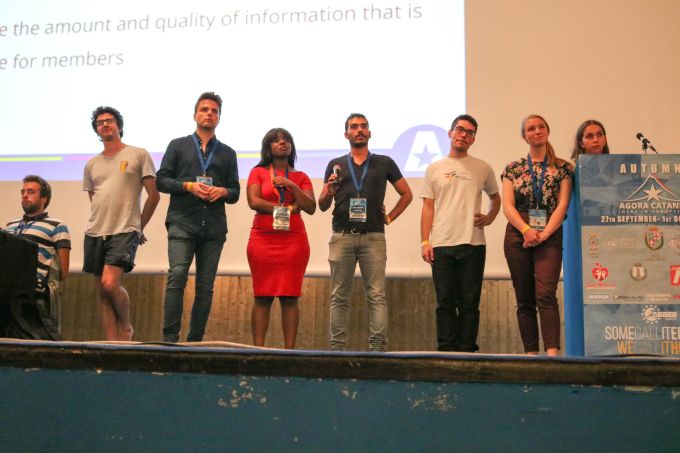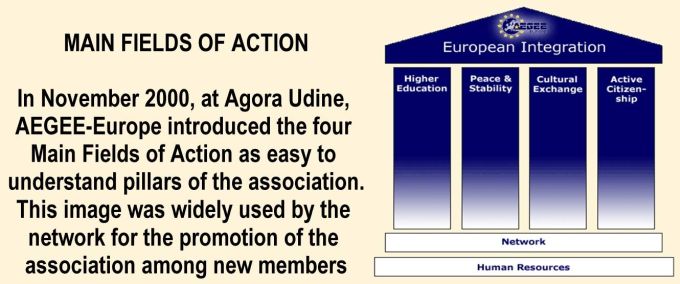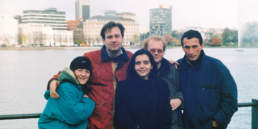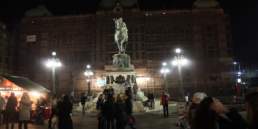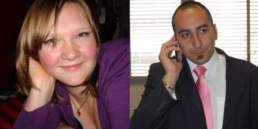The year 2018 looks promising for AEGEE, despite a rough start. In the focus: more thematic work, more conferences – and possibly a reform of the planning process that gives a bigger focus on thematic projects. An overview.
It was the main topic of last week in AEGEE: on 24th of January two CD members simultaneously declared their resignation, effective from the end of the month. The remaining five CD members replied that they did not agree with the given reasons and painted a different picture. It was interesting to see that the network did not attempt to start a serious discussion on the AEGEE communication channels. In the past, many people would write on the mailing list AEGEE-L and demand more information. This time: nothing, except for a deleted Facebook post.
Does it mean that people do not care? Not at all. They don’t discuss in the open, but privately – which is of course not really helping either, because it just supports rumours. The whole issue will probably come up again at the Agora Kraków. It will for sure affect the voting result on the Activity Report. In the past, it even caused votes of confidence several times – either initiated by the network or the CD itself. Could it also happen now? It depends. Regardless of what really happened in the CD, the network will see it as a failure to keep the team together, despite safeguarding measures like the Mediation Commission and the Advisory Board. However, with only a couple of months remaining and the need for a functioning CD, in this case the remaining CD members would probably re-candidate and be re-elected. Therefore the effect of a vote of confidence would be small.
Structural reforms on the horizon
On the other hand, the CD matter might take away the spotlight of another agenda item in Kraków: a possible review and reform of the planning process in AEGEE. This has been foreshadowed since the Agora Inspire session of Agora Enschede last year, when a group of members declared that they want to bring back the Main Fields of Action, AEGEE’s programmatic core. They were abolished in 2013 to increase the importance of the three-year Strategic Plan.
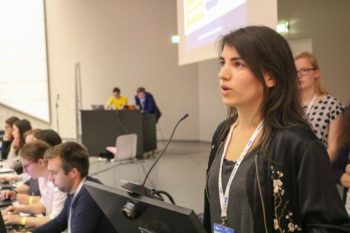
When the Golden Times asked 81 active members what they foresee as the highlight or biggest issue in AEGEE in 2018, altogether 14 people gave answers in the category “Structural reforms/Reform of planning cycle”. No other topic was mentioned more often. The answers were best summarised by Marina Klanjčić, AEGEE-Zagreb. Her reply to the question was: “I foresee major changes in 2018! A fully thematic AEGEE, focused on having a big impact on the society while at the same time, being recognized as the best organisation for self-development of an individual – of course, with the well-known amazing fun part along the way! Just wait for Agora Kraków!”
In short, the condition for change is fulfilled: high awareness of the problems, a problem solving strategy and motivation to act on it. These internal reforms might be on the agenda of 2018:
- change of planning process
- return of the Main Fields of Action to give AEGEE a clearer thematic profile
- the return of the flagship project as highlight of the year
Ongoing discussions on identity, vision and position of AEGEE
Closely connected, but a bit more vague is another topic that will come up in 2018: “the discussions on the future, focus, identity and strategy” of the association in 2018 were named by nine people in the Golden Times survey – that was the fourth place among all answers. Indeed, AEGEE has some ongoing issues, such as the decreasing number of locals and SUs, as well as the problem to position itself clearly in the highly competitive fields of students NGOs. As former Agora Chair and AEGEEan Magazine Chief-Editor Erika Bettin put it last December: “If I were to write a letter to Santa, asking for a wish, it would probably be a clear identity and direction for AEGEE. We should find again our place in the intricate world of student organisations, standing out by presenting a clear goal. Keeping on promoting budget travels and a multicultural experience is not enough anymore.”
So we know the problem, but don’t have a clear solution? Yes. Maybe the planning cycle reform will give AEGEE a major push. It won’t help though with other issues such as the perceived bureaucracy in the association. With the AEGEE identity discussion already going on for the whole decade, there will probably some smaller changes proposed, like every year.
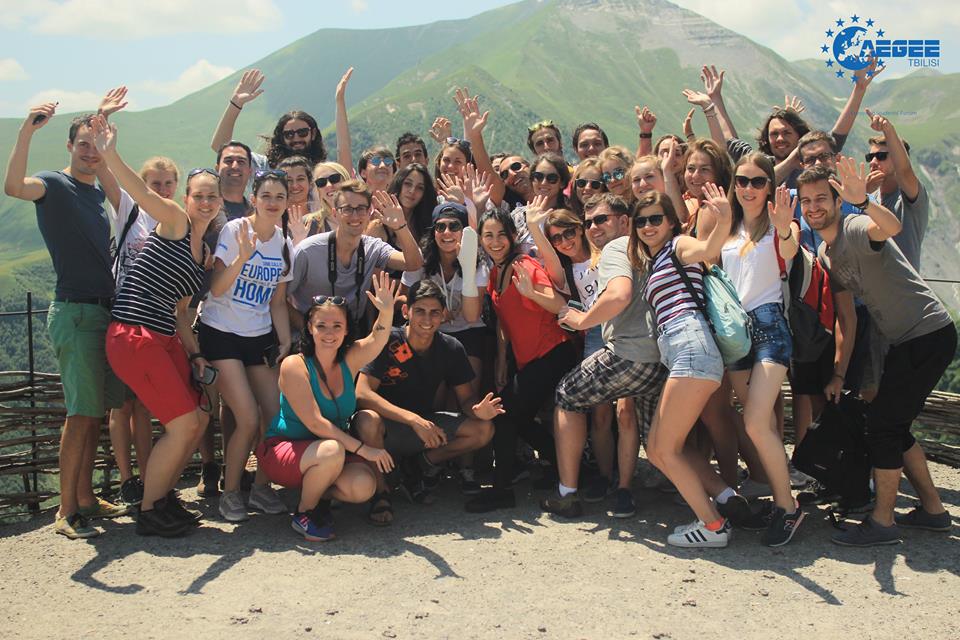
A very good year for thematic bodies
2017 saw the creation of new working groups. All four of them look strong and plan lots of actions. This is for sure the result of a better Strategic Plan, but also very good management of the working groups. Moreover, also changes in the society might help. With populism, nationalism, xenophobia and isolationism spreading all over the planet, the society gets more polarised. And for every person that gets more populistic, there is another one getting more open-minded, pro-European and ready to act!
Next to the working groups also the interest groups are doing fine. The newly founded Politics Interest Group (POLIG) for example is a great success. Despite the fact that interest groups were originally envisioned to be discussion cycles, several ones of them plan concrete conferences, trainings and action days.
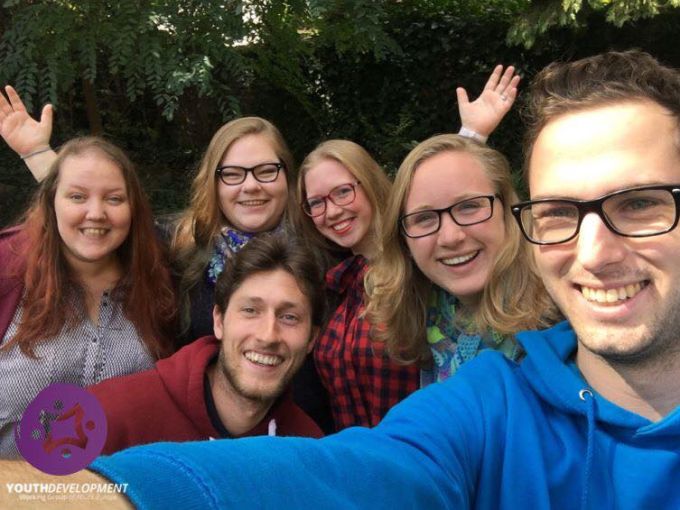
A great year also for interesting projects and conferences
After some years with a few weaker projects, also the European projects look particularly good. Especially “Europe on Track 5” managed to gather a great team with lots of amazing ideas. No surprise that this project got the second most mentions in the Golden Times survey about the highlights in 2018. Its topic “Sustainability” hit a nerve. In general “environmental topics” was mentioned eight times as highlight of 2018, so there is a chance to look deeper in these topics in 2018.
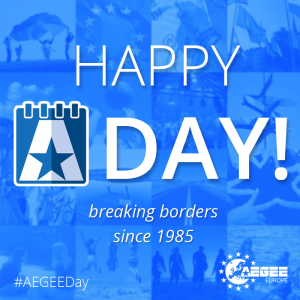 Another project highlight could be the 30th anniversary of the Summer University project – mentioned on 6th place in the survey. Last year there were several good brainstorming sessions how the celebrations could look like. However, there is no established project team yet, so we don’t know yet what will actually happen. Time is short to carry out good plans. Also the AEGEE Day looks promising in 2018, and with Pablo Hernández Rodriguez it has one of AEGEE’s most experienced members in charge!
Another project highlight could be the 30th anniversary of the Summer University project – mentioned on 6th place in the survey. Last year there were several good brainstorming sessions how the celebrations could look like. However, there is no established project team yet, so we don’t know yet what will actually happen. Time is short to carry out good plans. Also the AEGEE Day looks promising in 2018, and with Pablo Hernández Rodriguez it has one of AEGEE’s most experienced members in charge!
Oh, and let’s not forget about the third edition of Y Vote after 2009 and 2014. The focus of the project, which is aiming at informing young people about the European Parliament election in 2019 and motivating them to vote, will be next year. However, the project team around Philipp Blum from Aachen assembled already and is planning its first activities.
2018 will also see a renaissance for thematic conferences. Everyone who attended one, loves this type of events. However, many members don’t know what to expect from such a conference, which was once the dominant event type, next to the Summer Universities. We will see whether the conferences in Salerno, Thessaloniki, Warsaw, Heidelberg and other places will get enough participants. It is hard to reignite a lost tradition. There might be setbacks, but this should not discourage the organisers.
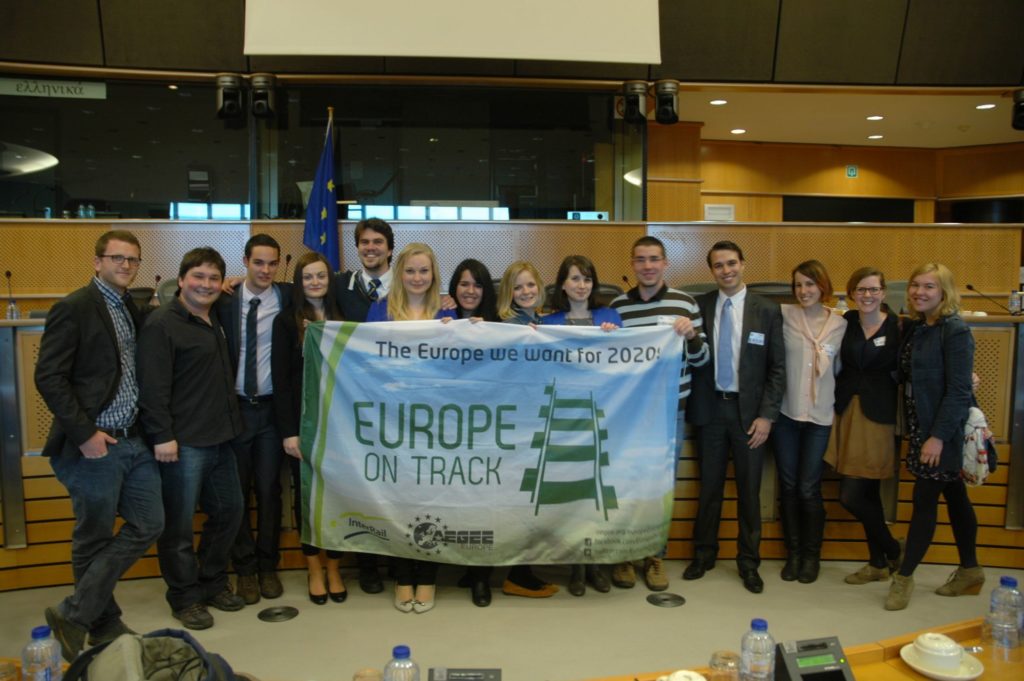
Need for more transparency
There are not many negative things to say about AEGEE in 2018. The level of enthusiasm is increasing, AEGEE looks on a good path. A couple of observations though:
- Discussion culture: AEGEE’s discussions take place nearly exclusively on Facebook, with all its good and bad effects. However, it seems that always the same people dominate the discussions. It would be good to see more members participate.
- Events: In 2018 there are many thematic events, action days, action months and other activities scheduled, but people and locals lack a clear overview on the many possibilities – despite nice new initiatives like the Telegram event channel. This might frustrate people. AEGEE needs more transparency by transparent and centralised info channels. In addition, AEGEE also needs to promote its events more outside of AEGEE, especially when it comes to conferences
- Network development. There are hardly any new AEGEE Contacts. In the past half year it was only one: Stockholm. At the same time several locals are rather weak. There is no clear strategy visible how to reverse the trend. Maybe we should try different way to motivate existing members and locals to help setting up new Contacts. What motivates people? Prestige and money. An idea: If a local helps setting up a new Contact in another city which then signs the Convention d’Adhesion, then it could get the honourable title “Star Antenna” for a year – or get a monetary reward of a few hundred Euros. After all, the new Contact Antenna will generate income for AEGEE.
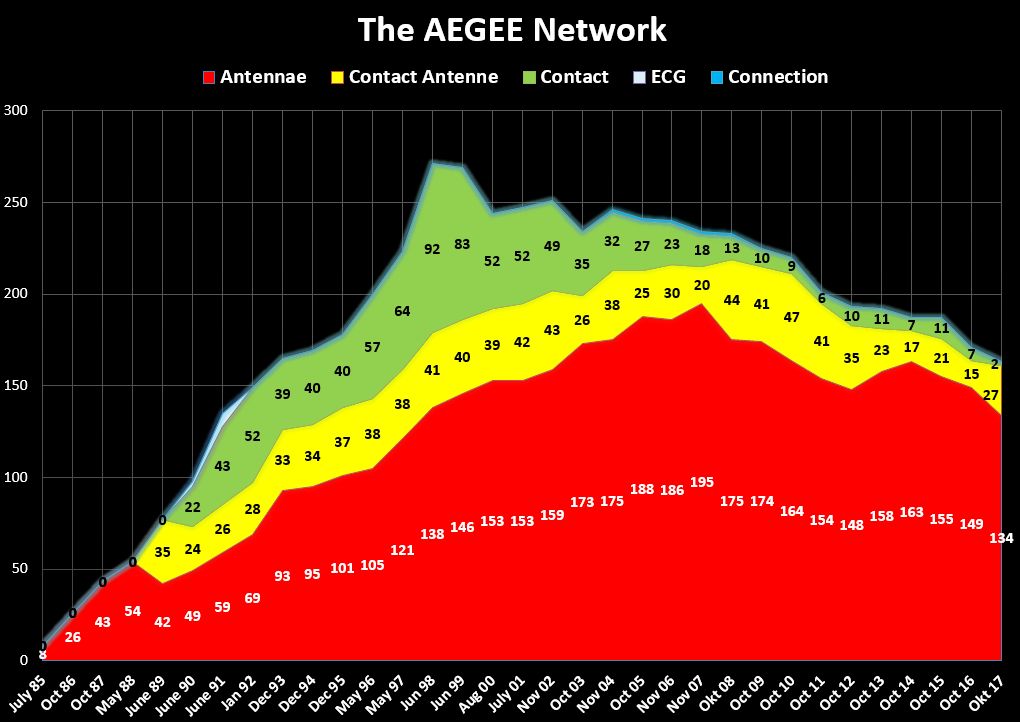
Statutory events in hotspots of Europe
Finally, many members expect a lot of this year’s statutory events: the Agoras in Kraków and Istanbul as well as the EPM in Yerevan. Agora Istanbul even ranked third among the highlights of 2018! Two of the three events take place in countries that are not in the EU, the third will be in a country that joined the EU in 2004. Also, the EPM Yerevan will take place in Southern Caucasus, which is a politically delicate area; while Poland undergoes EU law infringement procedures. Well, and there is no need to say that also Turkey has seen calmer days.
Finally, there has not been any Agora in Poland since 2006 and in Turkey since 2010 – and for the Caucasus region the EPM will be the first statutory event at all. These three events will hopefully help to connect some weaker areas of the network with the rest of AEGEE.


